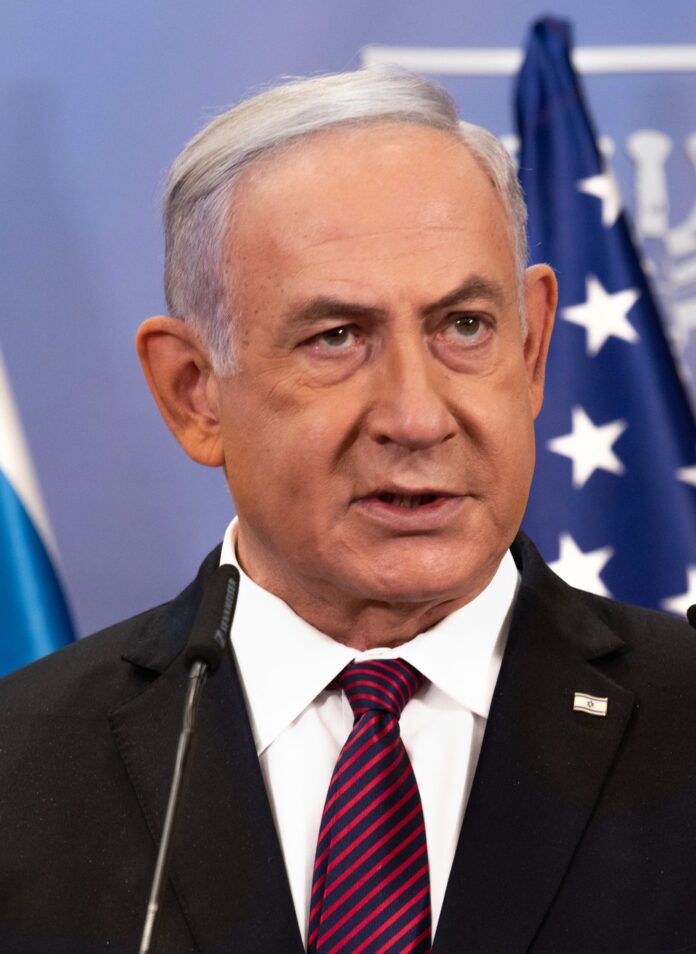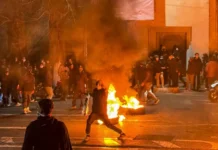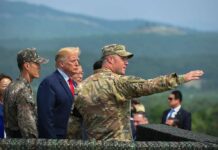The struggle against Israel’s war is a struggle against imperialism and capitalism
Per-Åke Westerlund, ISA International Political Committee
(This article was first published on 11 September 2025)
With the attack on the Hamas headquarters in Doha, Qatar, the Israeli government further escalated its regional war. It was an unprecedented attack in a country closely allied to the US, the location of the largest US military base in the Middle East. It was the sixth state capital attacked by Israeli missiles this year.
Netanyahu’s extreme-rightwing government counts on the backing of Trump whatever it does. The effect is a build up for never-ending wars in the region, further instability and suffering. Trump’s half-hearted complaints – “Unilaterally bombing… does not advance Israel or America’s goal” – sounded similar to his comments when Israel attacked Iran, where calls for peace ended with US bombings. He then added that it is a “worthy goal” to eliminate Hamas.
Hamas headquarters
The target was the headquarters of Hamas, in fact established by Qatar on request from Washington in 2011. It is located in a residential and commercial part of Doha. Israel used 10 missiles fired from fighter jets at long distance. The Trump administration denied they were forewarned, but instead got intel from their own military and then told the Qatari government. This was done only ten minutes before the attack.
The Israeli army and Netanyahu took full responsibility. The target was the Hamas delegation summoned to discuss a possible ceasefire deal. Five of them were killed in the attack, but not the chief negotiator, Khalil al-Hayya, or another top leader, Zaher Jabarin.
The team had just met Qatar’s Prime Minister Sheikh Mohammed bin Abdulrahman al-Thani to discuss the latest proposal for a ceasefire in Gaza. The proposal was said to originate from Trump and be accepted by Israel.
Since 7 October 2023 – now close to two years ago – with the Hamas attack and the start of Israel’s genocidal war, the authoritarian regimes of Qatar and Egypt have been used by the US as “negotiators” for ceasefire deals, with regular reports of progress and being “close to a deal”.
The history of Qatar’s involvement is hidden in US and Israeli propaganda. The oil and gas-rich autocracy – with 2.5 million inhabitants of which only around 10% are citizens, the rest are migrant workers – has long been a main player regarding Hamas. The US facilitated Hamas’ headquarters in Doha in 2011, and Israel accepted Qatar being the main financier of the Hamas administration up until 7 October. With his visit in May, Trump claimed to have signed deals with the Qatari state involving trillions of dollars, and that he had received an upgraded Air Force One as a gift.
During the genocidal war, negotiations have been ongoing in Cairo and Doha. The latest ceasefire, from 19 January this year, was unilaterally broken by Israel’s government, first with a total blockade of deliveries of food, medicines and necessities, then from 18 March with an escalated military attack.
Gaza and the West Bank
An August proposal for a deal was accepted by Hamas, while Netanyahu refused to even put it on the agenda of his war cabinet. Instead, his government pursued the plan to occupy the whole of Gaza. The population of Gaza City were ordered to evacuate, along with Gaza’s entire population of two million, to what the Israeli government calls a ‘humanitarian zone,’ a minimal area covering 11.5 percent of Gaza. Starvation and disease are rapidly increasing while Israel maintains its blockade. UN agencies say that 20,000 children have been killed during the genocidal war. That is one child killed every hour. The Israeli state also admits that it has deliberately targeted journalists, most recently at Nasser Hospital, calling them terrorists. As of last week, over 200 journalists had been killed in Gaza.
The Israeli government has also significantly stepped up its plans for total control of the West Bank. To begin with, it will take over 82 percent, leaving the remaining 18 percent to the three million Palestinians in the West Bank for the time being. New settlements will be established, dividing the West Bank into two parts, while even more motorways exclusively for settlers will cut the area off even further.
The attack on Doha is of course linked to the to the genocide in Gaza. For 23 months, the Israeli state has failed to achieve its target of extinguishing Hamas and the release of the hostages. During the same period, Netanyahu sent delegations to alleged ceasefire talks.
With events this year, this has changed. Trump launched the plan to deport the entire population of Gaza, encouraging Netanyahu and his extreme right ministers to go ahead with full occupation, continued bombing, shootings to kill at the so-called food stations, and forcing the people of Gaza into even worse camps. Washington’s plans for Gaza include concrete plans regarding which countries (Somalia, Libya, South Sudan, Somaliland, Ethiopia) the population will be deported to.
A regional superpower?
Also regionally, the Israeli government has gone all in. Since June, there has been the 12-day Iran war, and regular attacks on Syria and Lebanon, including on Damascus and Beirut. In both countries, the Israeli army has established bases, warning respective governments. In Syria, Israel wants to expand its so-called security zone close to Damascus and deeper into the south of the country. The day following the bombing of Doha, 35 were killed in a new attack on Yemen. Israel’s military capacity is used to establish it as a regional superpower, able to reach whatever target.
“Israel is able to do pretty much anything. They have the military means, the political will and the US political cover, so they are much more willing to take risks regardless of the ramifications,” said Emile Hokayem at the International Institute for Strategic Studies in London. “Fortress Israel may be fine in the short term, but they are shaking and disrupting the region like no other actor has in the recent past.” (Financial Times 11 September)
The actions of the Netanyahu government are creating new sharp contradictions. The main plan of Trump is, as always, business. He wants an agreement between Israel and Saudi Arabia, a continuation of the Abraham Accords that already exist between Israel and the United Arab Emirates, Sudan, Bahrain and Morocco. The regional warfare, the ongoing genocide in Gaza and the plans for the West Bank are throwing a spanner in the works, however.
Out of fear for mass reactions and revolts, the regimes in the region, close allies with the US, have to condemn Israel’s military actions and the genocide. Both the UAE and Saudi Arabia condemned Israel’s attack in Doha. The regimes themselves will probably also question how reliable Trump is, following his non-reaction.
The resistance
The war of extermination in Gaza is already a dominating factor in global politics and mass movements. The anger against Israel’s actions and against the US is increasing, but so are also the protests against governments around the world that today hypocritically criticize Israel, after long supporting all its actions. The same governments also continue to carry out repression against Gaza solidarity activists and demonstrations. Their role will be long remembered.
Also in Israel, a majority support an end to the war. Even the highest-ranking officers in the Israeli army have objected to the occupation of Gaza City. There, the most important task now is to build for a real general strike against war, occupation and the government.
At the same time, resistance and solidarity are growing globally. The largest effort by vessels attempting to break the blockade is now underway in the Mediterranean, the Global Sumud Flotilla, with hundreds of activists, including Greta Thunberg. Ships and boats carrying food, medicine and water have left Barcelona and Tunis after strong demonstrations.
European dockworkers are discussing following the call from ports in Italy and Spain to block all transport if the flotilla is attacked. The latest flotilla in June, like all previous ones, was attacked by the Israeli military. Israel’s far-right security minister, Ben-Gvir, advocates treating the activists as terrorists. Already a drone attacked the boat with the same team as in June, including Greta Thunberg.
It is the working masses in the region and globally that can stop the genocidal war. The struggle against Israel’s war is a struggle against imperialism and capitalism.




